-
 Bitcoin
Bitcoin $82,167.7231
-0.28% -
 Ethereum
Ethereum $1,791.7872
-1.35% -
 Tether USDt
Tether USDt $0.9998
0.00% -
 XRP
XRP $2.1291
0.35% -
 BNB
BNB $597.4305
-0.90% -
 Solana
Solana $124.3910
0.24% -
 USDC
USDC $1.0000
-0.01% -
 Dogecoin
Dogecoin $0.1658
-1.40% -
 Cardano
Cardano $0.6578
-1.64% -
 TRON
TRON $0.2315
-0.62% -
 Toncoin
Toncoin $3.9119
5.73% -
 Chainlink
Chainlink $13.3402
-0.82% -
 UNUS SED LEO
UNUS SED LEO $9.1021
-5.37% -
 Stellar
Stellar $0.2656
-0.04% -
 Avalanche
Avalanche $18.8205
-4.04% -
 Sui
Sui $2.3359
2.20% -
 Shiba Inu
Shiba Inu $0.0...01236
-1.25% -
 Hedera
Hedera $0.1680
-1.40% -
 Litecoin
Litecoin $85.5027
0.68% -
 Polkadot
Polkadot $4.0145
-0.22% -
 MANTRA
MANTRA $6.2126
0.50% -
 Bitcoin Cash
Bitcoin Cash $296.0064
-1.73% -
 Bitget Token
Bitget Token $4.5557
-1.02% -
 Dai
Dai $0.9999
0.00% -
 Ethena USDe
Ethena USDe $1.0000
0.03% -
 Pi
Pi $0.7669
-4.64% -
 Hyperliquid
Hyperliquid $12.3010
-2.32% -
 Monero
Monero $217.8263
1.28% -
 Uniswap
Uniswap $5.8549
-0.92% -
 Aptos
Aptos $5.2630
1.35%
Does the storage location of a Bitcoin wallet need to be changed regularly?
Bitcoin wallet location changes depend on wallet type and risk tolerance; hardware wallets prioritize physical security, while software wallets benefit from regular device or OS updates to mitigate malware risks.
Mar 25, 2025 at 11:14 am
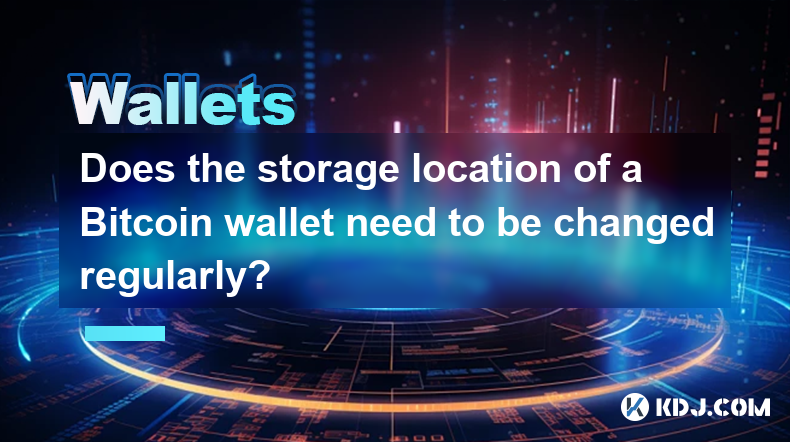
Does the storage location of a Bitcoin wallet need to be changed regularly?
The question of whether to regularly change the storage location of a Bitcoin wallet is complex, depending heavily on the type of wallet and the user's security concerns. There's no single definitive answer, as different approaches suit different risk tolerances. Understanding the various wallet types and associated security risks is crucial before deciding on a strategy.
Hardware wallets, for example, are generally considered the most secure. Their physical nature makes them less susceptible to remote attacks. While you might not need to regularly change the physical location of a hardware wallet, it's wise to keep it in a secure, fireproof safe, and consider rotating its use (e.g., using it only for significant transactions). The crucial element here isn't moving the device frequently, but ensuring its physical security.
Software wallets, on the other hand, are more vulnerable. These are applications running on a computer or mobile device. Their security depends heavily on the security of the underlying device. Regularly changing the storage location, in this context, might involve transferring your Bitcoin to a new software wallet on a different device or reinstalling the operating system on your current device. This is to mitigate the risk of malware or hacking compromises.
Cloud-based wallets present yet another scenario. While convenient, they inherently rely on a third-party provider. The security of your Bitcoin depends on the provider's security practices. Changing the storage location, in this case, means switching to a different cloud-based wallet provider, carefully vetting the new provider's security measures before making the transfer. This adds a layer of complexity but could be crucial in mitigating risks associated with a single point of failure.
Paper wallets, representing a more static form of storage, offer a different perspective. The key security concern here is physical security and the potential for loss or damage. Regularly changing the physical location might be a good idea to prevent theft or destruction. However, transferring funds from a paper wallet requires scanning the private keys, introducing a new vulnerability during the process.
The choice of how frequently, or even if, you change the location of your Bitcoin wallet depends on several factors:
- The type of wallet: Hardware wallets require a different approach compared to software or cloud wallets.
- Your risk tolerance: A high-risk tolerance might mean less frequent changes, while a low-risk tolerance could necessitate more frequent changes.
- The value of your Bitcoin: The larger the amount, the greater the incentive to prioritize security measures.
- Your technical expertise: The complexity of changing wallet locations varies depending on the type of wallet and your technical skill.
Choosing the right strategy involves a careful evaluation of these factors. There's no one-size-fits-all answer.
Step-by-step process of transferring Bitcoin between wallets (general example, adapt to your specific wallet type):
- Backup your current wallet: This is crucial to prevent data loss. The backup method depends on the wallet type.
- Choose a new wallet: Select a new wallet type and provider based on your security needs and preferences.
- Generate a new receiving address: In the new wallet, create a new receiving address where you'll transfer your Bitcoin.
- Initiate the transfer: Use your current wallet to send your Bitcoin to the new receiving address.
- Verify the transfer: Confirm that the Bitcoin has successfully reached your new wallet.
Frequently Asked Questions:
Q: Is it necessary to change my hardware wallet location regularly?
A: No, regularly changing the physical location of a hardware wallet isn't strictly necessary if it's already secured in a safe place. Focus on the physical security of the device itself.
Q: How often should I change my software wallet location?
A: There's no set frequency. Consider it whenever you suspect a security compromise or upgrade your operating system. Regular updates and strong security practices on your device are equally important.
Q: What are the risks of using a cloud-based wallet?
A: The main risks are reliance on a third-party provider and potential vulnerabilities within the provider's infrastructure. Diversifying across multiple providers can mitigate some of these risks.
Q: What is the safest way to store Bitcoin long-term?
A: Hardware wallets generally offer the highest level of security for long-term storage, combined with robust physical security measures.
Q: Can I use multiple wallets for different purposes?
A: Yes, many users employ multiple wallets. For example, one for daily transactions and another for long-term storage. This strategy improves security and organization.
Q: What should I do if I suspect my wallet has been compromised?
A: Immediately secure your device, generate new private keys (if possible), and report any suspicious activity to relevant authorities or the wallet provider. Transfer your remaining funds to a new, secure wallet.
Q: Are paper wallets truly secure?
A: Paper wallets offer a degree of security if handled correctly, but they are vulnerable to physical theft, damage, and loss. The process of using them also introduces risks. They are not recommended for large sums.
Q: How do I choose the right wallet for my needs?
A: Consider your technical skills, risk tolerance, the amount of Bitcoin you own, and your usage patterns. Research different wallet types to find one that best suits your specific requirements.
Disclaimer:info@kdj.com
The information provided is not trading advice. kdj.com does not assume any responsibility for any investments made based on the information provided in this article. Cryptocurrencies are highly volatile and it is highly recommended that you invest with caution after thorough research!
If you believe that the content used on this website infringes your copyright, please contact us immediately (info@kdj.com) and we will delete it promptly.
- Today's Top Crypto Gainers – Core, Fuel Network, CatSlap, Mantra, Polyhedra Network
- 2025-03-31 06:30:12
- Cardano (ADA) Gains Attention as Traders Increase Long Positions Despite Mixed Price Action and Weakening Technical Indicators
- 2025-03-31 06:30:12
- Japan Moves Toward Legalizing Crypto Assets as Financial Products
- 2025-03-31 06:25:12
- MakerDAO [MKR] has gained 6.7% over the past week.
- 2025-03-31 06:25:12
- Cardano (ADA) and Rexas Finance (RXS) Could Hit $5.00
- 2025-03-31 06:20:13
- As meme coin sentiment cools off, Dogecoin (DOGE) and Shiba Inu (SHIB) investors shift their attention toward Coldware (COLD)
- 2025-03-31 06:20:13
Related knowledge

How to easily generate a Bitcoin payment address
Mar 29,2025 at 10:49am
Generating a Bitcoin payment address might seem daunting, but it's actually quite straightforward. This process is crucial for receiving Bitcoin, as each transaction requires a unique address. Understanding how this works is fundamental to using Bitcoin effectively. This guide will walk you through the simple steps, regardless of your technical experti...
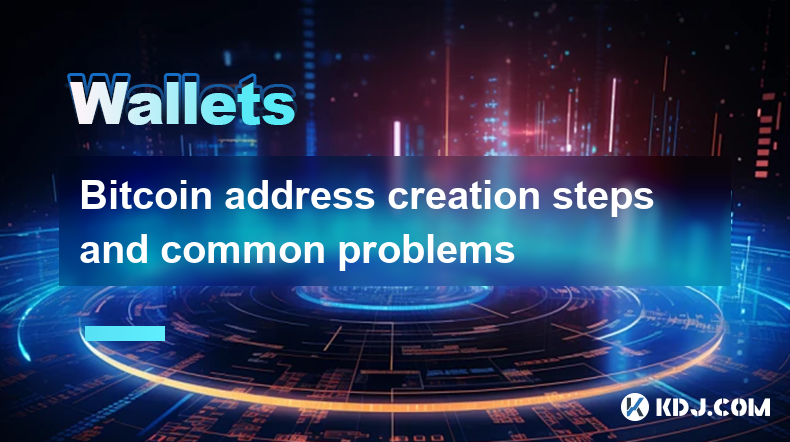
Bitcoin address creation steps and common problems
Mar 30,2025 at 06:07am
Understanding Bitcoin AddressesA Bitcoin address is a unique identifier, similar to a bank account number, used to receive Bitcoin. It's a string of alphanumeric characters generated from a public key, derived from your private key. Understanding the distinction between public and private keys is crucial for Bitcoin security. Your private key should be...
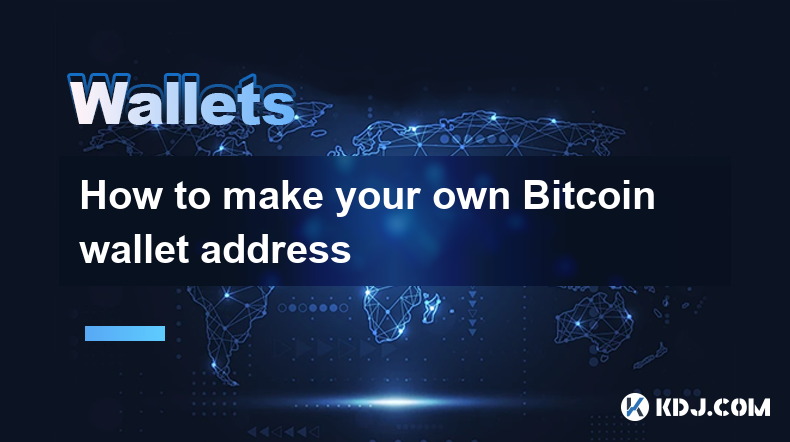
How to make your own Bitcoin wallet address
Mar 29,2025 at 08:42pm
Creating your own Bitcoin wallet address is crucial for securing and managing your Bitcoin holdings. It allows you to independently receive and send Bitcoin without relying on third-party services. This process involves understanding the different types of wallets and choosing the one that best suits your needs and technical expertise. Incorrectly gene...
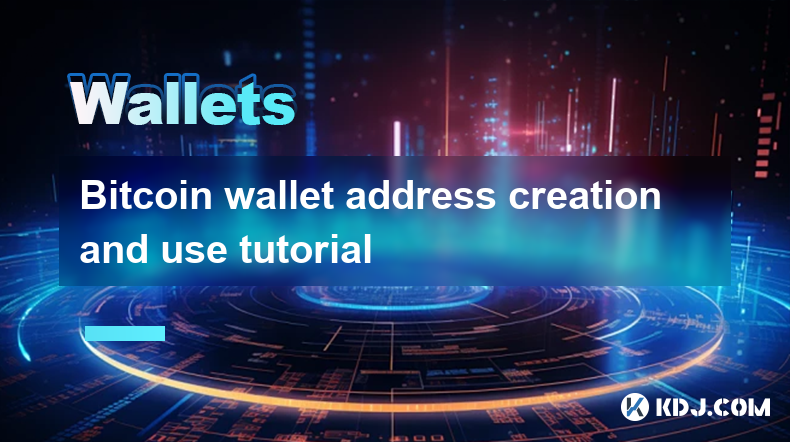
Bitcoin wallet address creation and use tutorial
Mar 29,2025 at 10:14pm
Understanding Bitcoin Wallet AddressesA Bitcoin wallet doesn't store Bitcoin in the way a traditional bank account does. Instead, it stores private keys, which are cryptographic secrets allowing you to access and spend your Bitcoin. Your Bitcoin address, on the other hand, is a public identifier, like an email address, that others can use to send you B...

Bitcoin address generation and secure storage guide
Mar 30,2025 at 08:07am
Understanding Bitcoin AddressesA Bitcoin address is essentially your public key, a string of alphanumeric characters used to receive Bitcoin. It's analogous to your bank account number. Unlike your private key, which is crucial for spending your Bitcoin, your address can be shared publicly without compromising your funds. Generating a new address is sim...
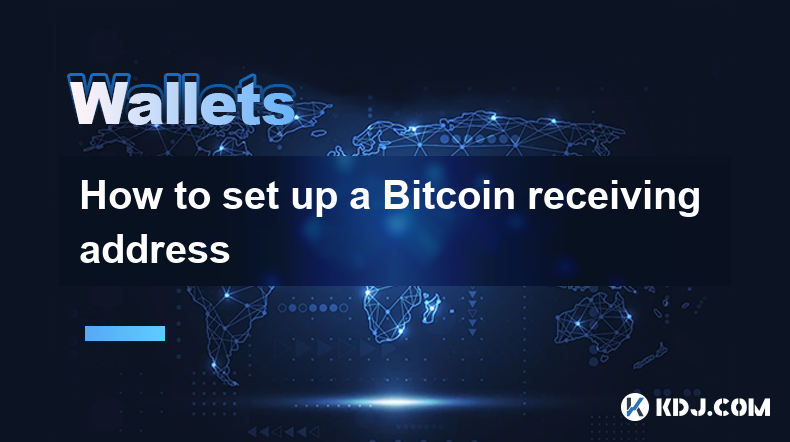
How to set up a Bitcoin receiving address
Mar 30,2025 at 06:14pm
Understanding Bitcoin Receiving AddressesA Bitcoin receiving address is essentially your unique identifier on the Bitcoin network. It's a string of alphanumeric characters that allows others to send Bitcoin to you. Think of it like your bank account number, but specifically for Bitcoin. You need a receiving address to receive Bitcoin. Crucially, you ca...

How to easily generate a Bitcoin payment address
Mar 29,2025 at 10:49am
Generating a Bitcoin payment address might seem daunting, but it's actually quite straightforward. This process is crucial for receiving Bitcoin, as each transaction requires a unique address. Understanding how this works is fundamental to using Bitcoin effectively. This guide will walk you through the simple steps, regardless of your technical experti...

Bitcoin address creation steps and common problems
Mar 30,2025 at 06:07am
Understanding Bitcoin AddressesA Bitcoin address is a unique identifier, similar to a bank account number, used to receive Bitcoin. It's a string of alphanumeric characters generated from a public key, derived from your private key. Understanding the distinction between public and private keys is crucial for Bitcoin security. Your private key should be...

How to make your own Bitcoin wallet address
Mar 29,2025 at 08:42pm
Creating your own Bitcoin wallet address is crucial for securing and managing your Bitcoin holdings. It allows you to independently receive and send Bitcoin without relying on third-party services. This process involves understanding the different types of wallets and choosing the one that best suits your needs and technical expertise. Incorrectly gene...

Bitcoin wallet address creation and use tutorial
Mar 29,2025 at 10:14pm
Understanding Bitcoin Wallet AddressesA Bitcoin wallet doesn't store Bitcoin in the way a traditional bank account does. Instead, it stores private keys, which are cryptographic secrets allowing you to access and spend your Bitcoin. Your Bitcoin address, on the other hand, is a public identifier, like an email address, that others can use to send you B...

Bitcoin address generation and secure storage guide
Mar 30,2025 at 08:07am
Understanding Bitcoin AddressesA Bitcoin address is essentially your public key, a string of alphanumeric characters used to receive Bitcoin. It's analogous to your bank account number. Unlike your private key, which is crucial for spending your Bitcoin, your address can be shared publicly without compromising your funds. Generating a new address is sim...

How to set up a Bitcoin receiving address
Mar 30,2025 at 06:14pm
Understanding Bitcoin Receiving AddressesA Bitcoin receiving address is essentially your unique identifier on the Bitcoin network. It's a string of alphanumeric characters that allows others to send Bitcoin to you. Think of it like your bank account number, but specifically for Bitcoin. You need a receiving address to receive Bitcoin. Crucially, you ca...
See all articles






















































































